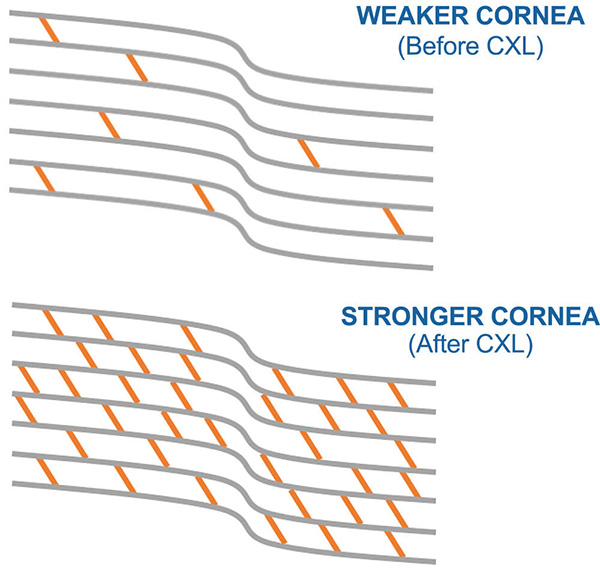X
The cornea is the clear, dome-shaped surface of the eye. It is primarily made of microscopic fibers called collagen. The cornea’s main purpose is to bend (refract) incoming light to focus it onto the retina, the back part of the eye that receives and transmits vision information to the brain.
To provide clear vision, the cornea must have a smooth, regular curvature. Some corneal diseases, such as keratoconus, can cause the cornea to bulge into an irregular shape. This causes blurry vision and light sensitivity.
Corneal cross-linking, a groundbreaking procedure performed by Dr. Jesse Vislisel at Associated Eye Care, can stop the progression of these corneal diseases and eliminate the need for major surgery such as corneal transplantation. Dr. Vislisel is a board-certified ophthalmologist and cornea specialist in Stillwater, MN.
Corneal collagen cross-linking, or CXL, is a procedure that strengthens the cornea to stabilize diseases that cause the cornea to form an irregular shape. Cross-linking is the first and only treatment available to prevent such eye conditions from worsening. The primary goal of the procedure is to prevent progression of the disease process, though many patients also experience improvement in corneal curvature and vision after recovery.
In some cases, the corneal shape can be significantly improved by combining CXL with topographically-guided photorefractive keratectomy (PRK). During this PRK procedure, pre-operative scans are used to plan a customized laser treatment aimed at improving the cornea’s shape to reduce glasses prescription and improve vision quality.

During the procedure, riboflavin (vitamin B2) drops are repeatedly placed in the eye and low-dose ultraviolet light is applied to the cornea. This causes a chemical reaction that thickens the natural collagen fibers in the cornea and forms additional bonds, or “cross-links,” between them. These changes strengthen and stabilize the cornea to prevent further distortion in shape. The treatment is extremely effective and stops disease progression in over 90% of cases.
Corneal cross-linking is typically recommended for patients with the following eye conditions that cause corneal thinning, weakening, and irregular corneal curvature:
Corneal cross-linking also kills harmful bacteria, fungi and other organisms. It is therefore also effective for treating corneal infections that are unresponsive to eye drops.Several factors are taken into consideration when determining whether CXL is a good treatment option:
The best way to determine your candidacy for corneal cross-linking is to talk to your eye doctor. A comprehensive examination and review of your symptoms will help your doctor recommend the best treatment for your eye condition.
Your doctor will schedule a clinic visit to evaluate and discuss your condition. At this visit, you will undergo a detailed eye examination including vision assessment, corneal thickness (pachymetry) measurement, and mapping of the corneal shape (topography). This helps your doctor assess how to best treat your eyes.
It is normal to experience discomfort, blurred vision, and sensitivity to light for days or weeks after your procedure. You will be prescribed anti-inflammatory eye drops to help reduce inflammation and antibiotic drops to prevent infection. Make sure to keep your eyes clean and avoid rubbing them after the procedure. If you experience pain that gets progressively worse, a sudden decrease in vision, or anything else out of the ordinary, contact your doctor immediately.
Several follow-up appointments will be required to ensure the cornea is healing properly. Once healing is complete, you may benefit from custom contact lenses to achieve the best vision possible. Your doctor will measure your vision over time and make a recommendation based on the results.
Associated Eye Care offers treatment for cornea problems at our clinic on Curve Crest Boulevard in Stillwater. Corneal cross-linking consultations are scheduled with Dr. Vislisel at our Stillwater Woodbury locations. Schedule an appointment now or call (800) 846-1877 for more information.
Our excellent team of providers is here to make sure your experience is a positive one. Whether it's our doctors or our professional staff, we promise to make every effort to give you the best possible care.

Dr. Vislisel is a board-certified ophthalmologist specializing in cornea, external disease, and refractive surgery. He received
his medical degree from the University of Iowa in 2007 and graduated with Research Distinction. He then completed his medical internship in Tucson, Arizona and returned to the highly-ranked University of Iowa for his ophthalmology residency and fellowship training in cornea and external eye disease where he received the Fellow Teaching Award and the P.J. Leinfelder award for excellence in research. He has special interest in cataract surgery, corneal transplantation, corneal crosslinking, anterior segment and ocular surface surgery, and laser refractive surgery such as LASIK.
Dr. Vislisel enjoys technology and the rapid technological advances that occur in the field of ophthalmology. He has authored many peer-reviewed publications and book chapters and previously served as an editorial board member and chief medical editor for EyeRounds.org, a leading resource for ophthalmology education. His outside interests include music, cycling, fishing, outdoor recreation, and spending time with his wife and three children at the family cabin.